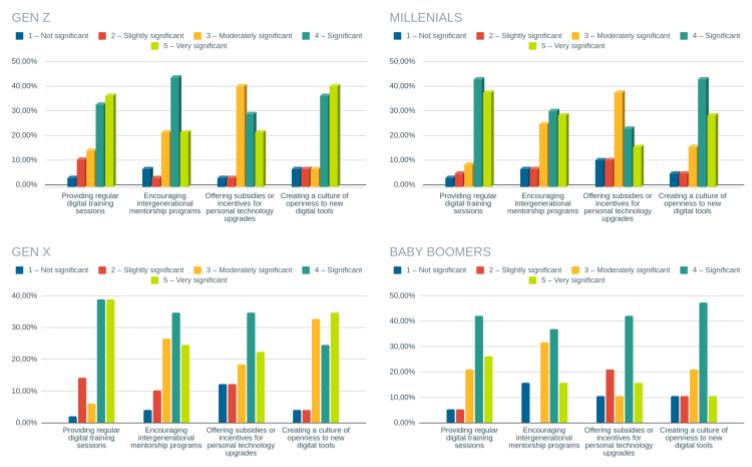38. How effective do you think the following strategies are for reducing digital inequality in your workplace? (1 = Not effective, 5= Very effective)

This question aims to assess the extent to which employees perceive the effectiveness of different strategies to reduce digital inequality in the workplace. In a context where digitalisation is increasingly central, it is crucial to understand which interventions can facilitate equal access to digital skills, technologies and culture among employees.
The questionnaire collected data to capture differences in perceptions and preferences regarding four different strategies:
- Providing regular digital training sessions
- Encouraging intergenerational mentorship programmes
- Offering subsidies or incentives for upgrading personal technology
- Creating a culture of openness to the adoption of new digital tools
The analysis shows a clear cross-generational preference for regular digital training as the most effective strategy in tackling digital inequality, followed by the promotion of a culture open to digital innovation. Generational differences indicate that while younger generations look forward to cultural change and mentorship programmes, more mature generations prefer more concrete and traditional approaches. The provision of technological aids is generally the strategy least perceived as a priority, perhaps because it is considered marginal compared to the need to improve skills and attitudes.
Gen Z values regular digital training and fostering a culture receptive to new digital tools. They naturally embrace continuous learning and technology adoption. While intergenerational mentorship and technology subsidies are seen as helpful, training and cultural openness are considered the key factors to reduce digital inequalities.
Millennials highly appreciate structured digital training and an open digital culture. They rate mentorship slightly lower and see technology subsidies as less effective, likely due to their relative independence with technology. This generation prefers well-organized cultural and educational initiatives over material incentives.
Gen X similarly prioritizes regular training and openness to digital tools. They regard mentorship as important and value technology subsidies somewhat more than younger groups. This generation acts as a bridge, valuing both guided learning and practical technological support.
Baby Boomers give slightly lower ratings overall but still see training and digital culture as the most effective strategies. They perceive mentorship and subsidies as less impactful, possibly due to challenges or resistance to adopting new technologies. Traditional training approaches resonate better than rapid cultural or material changes.
This post is also available in: German Italian Polish Portuguese (Portugal)







